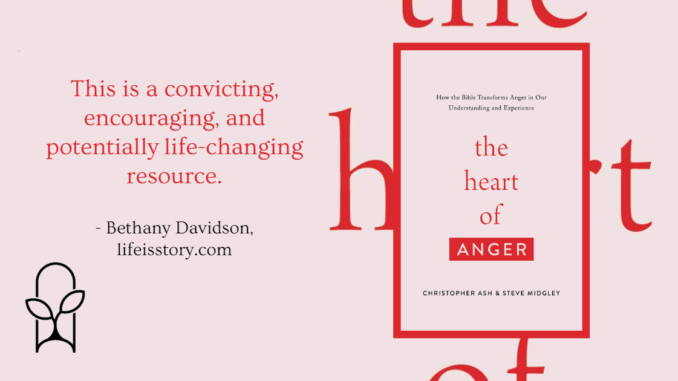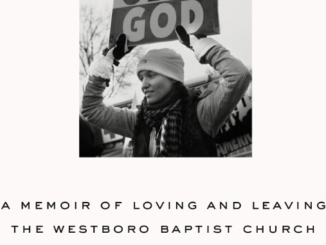
Also by this author: Mental Health and Your Church: A Handbook for Biblical Care (A Ministry Guide to Mental Illness, Anxiety, Depression, Trauma and Addiction), Understanding Trauma: A Biblical Introduction for Church Care
Published by Crossway Books on February 23, 2021
Genres: Non-Fiction, Christian Life, Theology
Goodreads

How should Christians understand anger, evaluate it, and respond for good?
Each person experiences anger--in their own hearts and in the words and actions of others. In this doctrinal, pastoral, and practical book, Christopher Ash and Steve Midgley explore the Bible's teaching about anger through biblical examples such as Moses, Saul, David, and the Ephesian church as well as present-day accounts. Though sometimes right and godly, anger is more often rooted in greed, lust, love of control, or pride. Only once the source of anger is recognized can the gospel of Jesus Christ--God's perfect wrath poured out on his Son for the sins of many--bring true freedom, transforming a heart of anger into a heart filled with the love of God.
The Heart of Anger is insightful, clear, and well-organized, providing deep insight into human anger, God’s righteous anger, and the ways that Christ can change our hearts. The authors provide case studies and examples of anger from the Bible and from modern life, and even though they acknowledge the deep power of anger, they show that it is possible for people to choose self-control, let go of prideful, demanding, self-righteous rage, and live at peace with others. They also address how we can navigate issues of righteous anger, so that we can feel godly rage at injustice and evil without acting out in sinful ways, or making our anger all about ourselves. This book is very practical and wise, and is the perfect example of how helpful biblical counseling can be, when it is based in a profound understanding of human nature and Christ’s transforming power.
I have always struggled with anger, and it is difficult for me to find resources that make a difference in my life. Many repeat the same ideas that I already know and struggle to put into practice, but this book has such a holistic understanding of anger that I was able to find new insights, get a better perspective, and calm down about things I have been struggling with for months. This book was the perfect blend of biblical teaching, practical advice, and psychological insight, and the authors write with sensitivity to readers’ emotional struggles and the reasons why dealing with anger is so hard.
Structure and Content
The Heart of Anger: How the Bible Transforms Anger in Our Understanding and Experience has four main parts, and each one builds on the last. Christopher Ash and Steve Midgley explain the deeper motivations behind human anger, the holy and righteous anger of God, first steps in diffusing anger, and how Christ can change our hearts. At the beginning, they illustrate sinful anger by summarizing key Bible stories, showing how desires for control, possessions, sexual satisfaction, and reputation characteristically fuel anger. However, even though they focus on men’s anger through portraits of powerful men in the Bible who had the social privilege to express their anger in major ways, the authors make it clear that anger is not a gendered issue, and speak to women as well.
The authors describe anger’s harmful effects, the relationship between anger and power, the consequences of pride and self-righteousness, and the ways that others’ affirmation can entrench us in our anger and create a mob mentality. On a related note, the authors contend that “righteous anger” is far rarer than we think, since when we convince ourselves that we are right, we remain blind to our sin, ignore alternate perspectives, and cannot reconcile with others. In the section about God’s anger, the authors show what truly righteous anger looks like, and in the third part, they provide practical tips for diffusing our anger and understanding the deeper emotions behind it. The final section addresses how we can find peace through Christ as he transforms our selfish desires, gives us power, wisdom, and love to serve Him and others, and gives us a new humility.
Audience
The authors speak to both men and women throughout the book, and they are sensitive to people’s different life situations. Instead of assuming that their readers are all married with kids, they write to people in a variety of life stages, drawing in examples and applications from work, rooming situations, and friendships. Also, at the beginning of the chapter about parenting, the authors acknowledge that even though some of their readers don’t have kids, they chose as a clear case study that people can relate to from their upbringing or cultural observation, even if it isn’t directly relevant to them. The chapter is incredibly insightful, emphasizing how often parental anger arises from fear and a desire for control, but I enjoyed it even more because of the authors’ sensitivity and awareness to where different readers are coming from.
This book is also appropriate for teenagers, as long as they are mature and informed enough to deal with some of the sexual elements in this book. The authors connect the role of entitled anger to sexual assault and general abuse, and as long as a teenager can read at an adult level and handle these occasionally recurring themes, this book can be helpful and enlightening for them. I definitely would have benefited from this book in high school, and it is especially important now, since our society increasingly views anger as a valuable tool, not a personal problem to overcome. This book can help teens and adults counter narratives about anger being a good leadership skill, or a way to find justice, since the authors differentiate corrosive, prideful rage from truly righteous anger that elevates the good of others.
Conclusion
In The Heart of Anger, the authors focus on the deeper issues behind anger, instead of just recommending coping skills. They provide insight into human nature, God’s holiness, and the life-transforming power of the gospel, and I found this book deeply helpful. As I read it, I could clearly see how often my anger flows from acting as if I am God, should be in control, know all of the relevant facts, and am in a position to judge. This book has helped me get perspective and diffuse anxious, angry thought spirals before they begin, and I would highly recommend it to any Christian who struggles with anger. I would also encourage pastors and counselors to read it for themselves and the people they minister to. This is a convicting, encouraging, and potentially life-changing resource, and I am so thankful that I got to read it.



